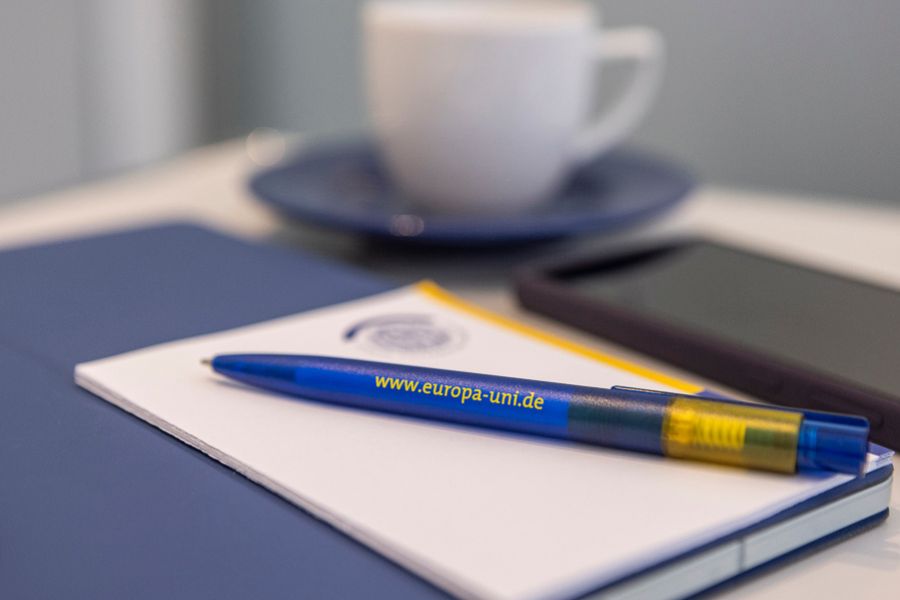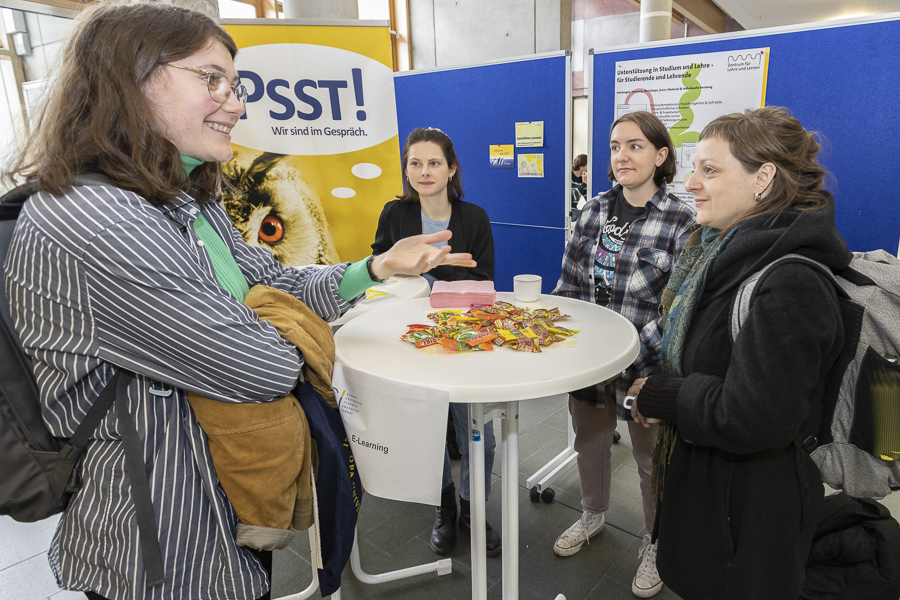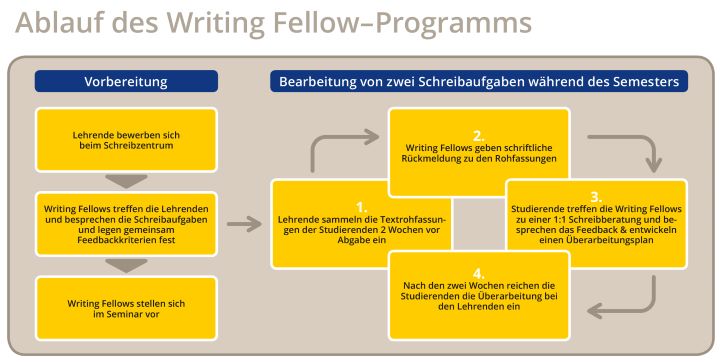Writing-intensive teaching
Writing-intensive teaching
When it comes to "writing in teaching", the first thing that probably comes to mind is writing as an examination tool, for example in the form of assignments, essays or exams. However, writing is also an extremely effective medium for thinking and learning. In writing-intensive courses, this potential of writing is utilised as students engage with subject-specific practices and concepts in greater depth through reading and writing. Writing Fellows and the use of Artificial Intelligence (AI) offer additional support and innovative approaches for the integration of writing assignments. The Center for Teaching and Learning (ZLL) provides support in designing such writing assignments in a meaningful way and integrating them into courses without major effort.

Writing Fellows

Writing Fellows support courses by working closely with the course management and acting as a point of contact for students. Over the course of the semester, they provide individual feedback on written work according to an agreed structure. Writing Fellows are qualified through special training modules that they have completed in addition to the regular peer tutoring training at the Center for Teaching and Learning. This qualification enables them to offer subject-specific or thematic support in academic writing processes. Some Writing Fellows, for example, are particularly familiar with cultural studies writing methods, while others bring expertise in digital writing, especially on topics of digitality in law or economics courses.
Precisely because Writing Fellows are peers and do not evaluate the texts, they can optimally support the students' writing process and the development of their writing skills in a course. The strength of the peer tutoring approach lies in meeting students at eye level, and so Writing Fellows discuss the sometimes sensitive issues associated with writing in the course among peers in a pressure-free space and an open atmosphere. The meetings with the Writing Fellows also serve to "demystify" academic conventions, which can cause problems for first-year students in particular. As peers, Writing Fellows embody the fundamentals of collaborative learning, critical thinking and writing.
Information event for the summer semester 2025
On 5 March 2025, an information event on the use of Writing Fellows in your course will take place online from 13:00 - 13:45. Find out more about the programme and ask questions.
Online via Zoom: https://europa-uni-de.zoom-x.de/j/67536321159?pwd=1wGdfcFanQRRlPkbOcyvioZBSK0Gvs.1
Writing Fellows for the summer semester 2025
Information on the Writing Fellows in the summer semester 2025 can be found linked here.
Advertisement for lecturers
Writing Fellows support and accompany lecturers in the realisation of their courses and give students individual feedback on their texts and their writing process. Lecturers can apply to the Writing Centre until 16 March 2025 to run a course in cooperation with Writing Fellows in the summer semester 2025. The application form for lecturers can be found here.
Information on the Writing Fellows
The Writing Fellows work closely with teachers and students in a seminar. They provide all students in the seminar with written feedback on their texts and draw up a revision plan together with them in a personal discussion. The students then revise the texts independently and submit a final version of the text to the teacher. In the Writing Fellow programme, everyone involved can learn something and expand their skills: the writing, feedback, revision and reflection loops, which follow a fixed procedure, ensure the possibility of an open examination of one's own academic writing practice for teachers as well as for students and Writing Fellows.
Here you will find a graphical overview of the programme flow

Each Writing Fellow supports ten to twelve students in revising two texts per semester. All participants in the course are required to submit rough drafts of their texts to the Writing Fellows. The Writing Fellows read the drafts carefully, give feedback on them and provide the students with an annotated version of their texts for revision. Each student will then meet with their Writing Fellow to create a revision plan together by negotiating the strengths and weaknesses of the submitted text. These individual meetings last approximately 30 minutes. The students then revise the texts independently and submit a final version of the text to the teacher together with the Writing Fellow's comments and reflections for revision. In this way, students focus on developing their own subject- or topic-specific writing skills over the course of the semester.
The exact procedure is set out before the start of the course in an agreement between the lecturer and the Writing Fellows that is tailored to the course.
Wish you...
... a better quality of student texts so that you can spend more time teaching?
... to strengthen the writing skills of your students and their ability to work scientifically?
... teach academic writing in the seminar alongside your subject content?
The Writing Centre's Writing Fellows can help you with this and...
... help you to familiarise students with the rules of academic writing.
...provide suggestions on how writing tasks and feedback can be designed to support students in their learning.
... help students to understand that revising texts is part of successful academic work.
You can apply to work with our Writing Fellows every semester. Register at zll@europa-uni.de.
More benefits:
- Students engage intensively with academic writing and their own writing process
- Improved quality of submitted texts through feedback and revision
- deeper insights into the students' learning processes
- individualised and needs-oriented support for students by the Writing Fellows
- Making optimum use of feedback as a teaching and learning tool
Your course will be accompanied by Writing Fellows this semester? For you, this means that you will be supported in writing your academic texts for this seminar.
You get...
... oral and written feedback on your written texts.
... the opportunity to share your thoughts.
... the chance to develop your writing skills on texts that you have to write for the performance assessment anyway.
... the opportunity to sift through the academic jungle together with the Writing Fellows.
More advantages:
- Learn about academic writing by working on current writing projects
- Discussions about writing among fellow students
- Response to texts without evaluating
Are you interested in supporting your fellow students in the writing process and at the same time working closely with lecturers on their seminar planning? Would you like to gain an insight into the academic world and have the opportunity to play an active role in shaping it?
Students who want to become Writing Fellows and be part of a productive teaching and learning culture at Viadrina first complete the training to become a writing consultant. They can then apply to work at the Center for Teaching and Learning. Writing Fellows are integrated into the Writing Centre team and regularly exchange information about their work. In addition, at least one further training course and one team day are organised each semester. Writing Fellows also have the opportunity to take part in specialised conferences on writing didactics.
Writing Fellows - an excellent programme
Since the winter semester 2013/14, Writing Fellows have supervised over 400 students in numerous courses across all Faculties at Viadrina. Evaluation and accompanying research show: Everyone involved benefits greatly from the programme.
Funded in the Lehren Kolleg 2015
Writing Fellow Programme of the Goethe University Frankfurt (Main)
SIG Writing Fellows of the Society for Writing Didactics and Writing Research
Centre for Teaching and Learning
Writing centre
- Europaplatz 1 | 15230 Frankfurt (Oder)
- Room: GD 03
- 0335 - 5534 2540
- schreibsprechstunde@europa-uni.de